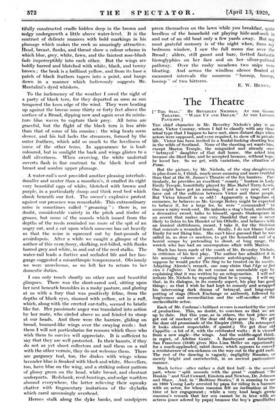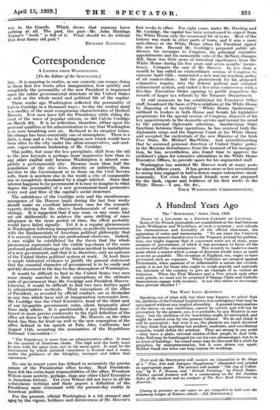The Theatre
[" THE STAG : • By BEVERLEY NICHOLS. AT THE GLOBE THEATRE. " WANE Ur AND DREAM." AT THE LONDON PAVILION.] ME chief character in Mr. Beverley Nichols's play is an actor, Victor Conway, whom I fail to classify with any thea4 trical type that I happen to have met, since distant days when actors were supposed, and even required, to show off in private life. Victor has been invited to a feudal-looking shooting box in the wilds of Scotland. None of the shooting set wants him, except Marion Temple, the misguided and already once " betrayed " daughter of that dull house. She asked hini because she liked him, and he accepted because, without hope he loved her. So we get, with variations, the situation of ,Fame.
But the picture, by Mr. Nichols, of the stag slaughterers in plus-fOurs 1.4,1 think, much more amusing and more truthful than that at the St.. James's Theatre of the fox hunters. Par= tieularly, he. provides an excellent " county " hostess in Lady Emily Temple, beautifully played by Miss Mabel Terry-Lewis. One might have got an amusing, if not a very new, sort of farce out of the collision between Victor and these people. But Victor himself is so odd I Apparently a tragedian of eminence, he behaves as Mr. George Robey might be expected to behave if, for a large fee, he were commanded'td amuse a rainy week-end. He unhooks a stag's head, unsheathi a decorative sword, talks to himself, spouts Shakespeare in an accent that makes one very thankful that one is never likely to listen to his Hamlet or his Othello, and behaves with 'an ironical skittishness, meant, I take it, for the StOieisni that conceals a wounded heart. Really, I do not blame Lady Emily for not liking him. She can't have guessed that he was called in, as dens ex machhaa, to get the household out of horrid scrape by pretending to shoot, at long range, the wretch who has had an unscrupulous affair with Marion.
Much has been made of the youth of Mr. Beverley Nichols, in criticism of his first play. The author has admitted it in his amusing volume of premature autobiography. But I suppose he would prefer The Stag to be treated on its merits. Adapting Alceste's remark, one may claim that l'dge ne fail rien a Paffcrire. You do not excuse an unreadable epic by explaining that it was written by an octogenarian. I will not irritate Mr. Nichols by repeating that he is young. I will say that, in its dialogue, in its comedy aspect, his play has good things ; so that I wish he had kept to comedy and scrapped his intervening dark drama of betrayal, and :long-rang potting of stags (Stock Exchange or antlered), followed by forgiveness and reconciliation and the self-sacrifice of the unclassifiable actor.
Each of Mr. Cochran's brilliant revues is marked by the yeas of_ production. This, no doubt, to convince us that we are up to :date. But this year, as in others, the best jokes are got out Of mockery of the dear old days gone by. We gel the dear-old promenade of the Empire (1910). (In retrospect it looks almost respectable, if quaint.) We get dear oN C,oppelia—a bit of it, with the celebrated waltz : it is view from n new angle—the wings. And the middle-aged think, in regret, of Adeline Genee. A flamboyant and futuristic San Francisco (1840) gives Miss Lina Meller an opportunity for a much-applauded, rabid dance, which appears to convey a reniiniseenceof sea-sickness on the way out in the gold rash: The rest of the dancing is vaguely, negligibly Russian, or merely bright and eartwheelish, in an ancient pantomimiC manner.
Much better—after rather a dull first half—is the second part, where " split seconds with the great " confront "Mr Ruskin " and Noel Coward, Einstein and Newton, Dr. Johnson and Shaw. And, in " Bedtime Stories," it is amusing to see an 1860 Young Lady arrested by papa for riding in a hansoril with an actor, for whom mamma felt an inclination at the ,time of her engagement; 'while a very loud laugh greet> mamma's remark that her son cannot be in love with, an actress (once adored by papa) because the boy's grandfather was in the Guards. Which shows that mamma knew nothing at all. The past, the past—Mr. John Hastings Turner's " book " is full of it. What should we do without that dear funny old past ?
RICHARD JENNINGS.



















































 Previous page
Previous page